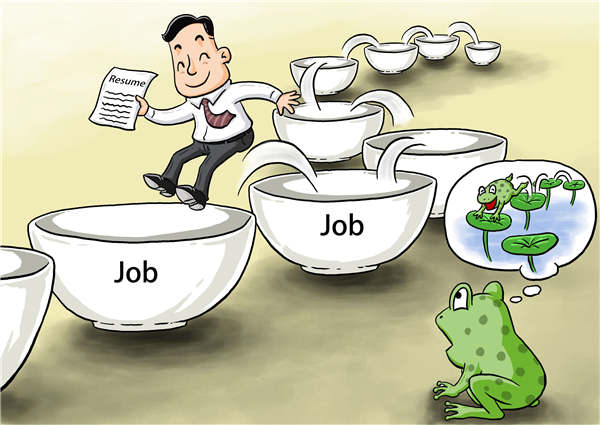Job-hopping generation


Young people born after 1990 grew up in an era of relative affluence, and change employers frequently for individual goals. Xu Haoyu reports.
Job-hopping is now a buzzword for young Chinese-those in their 20s, in particular, change jobs more frequently than previous generations.
More than 60 percent of the post-1990 generation stayed in their first job for less than a year after graduating from university, and, among them, 38 percent changed jobs in less than six months, according to a news report by the China Youth Daily in late 2017.
Wang Yin, a 25-year-old Shaanxi native, describes herself as typical of the post-1990 generation-full of ideas, unsettled, with the urge to learn more.
Within a year, she had changed jobs three times.
She left her hometown in Xi'an, the capital of Northwest China's Shaanxi province, and sought job opportunities in Beijing last March.
With a bachelor's degree in business management from the University of Leicester and a master's degree in international management from the University of Bath in the United Kingdom, finding a job was not a difficult matter for Wang.
She first worked in a commercial real estate consulting company.
Five months later, she quit because she felt unsatisfied with her duties, which were mainly preparing PowerPoint presentations and planning events, which she says were "a bunch of boring trifles".
Her daily work was not relevant to her educational background, and did not help her accumulate any field expertise, she says.
"I started as a fresh hand who knew nothing about commercial real estate. After a few months, I was still ignorant and inexperienced.
"Trading my time for 7,000 yuan ($1,100) a month was not a deal I wanted."
She kept her frequent job-hopping from her parents, who she thought would be worried about her unstable employment situation.
"I make my own decisions, and I will pay the price personally, no matter what," she says.
Foreseeable career growth
With the rapid economic development of the country, the job market has witnessed great changes over the years.
Among the post-1990 generation, the average time an employee holds a job is 18.5 months, according to a survey by 199IT.com, an internet statistics organizer.
Among the post-1980 generation, the number is 26.5 months.
Though many assume a higher salary is usually the main motivation for a job change, this is only partly true.
Xu Jia'nan, a 25-year-old internet product manager from Hefei, East China's Anhui province, has changed jobs three times in a year, after he moved to Hangzhou for work.
His job is to design the interface, functionality and logic of apps, after analyzing user feedback and assessing their needs to continually improve the apps.
He has been working for small companies, which he left as soon as the product he developed matures.
Xu finds updating an app is not as exciting as developing one.
He attaches more importance to the work experience he acquires from different projects, which requires job-hopping, until he starts his own firm.




































